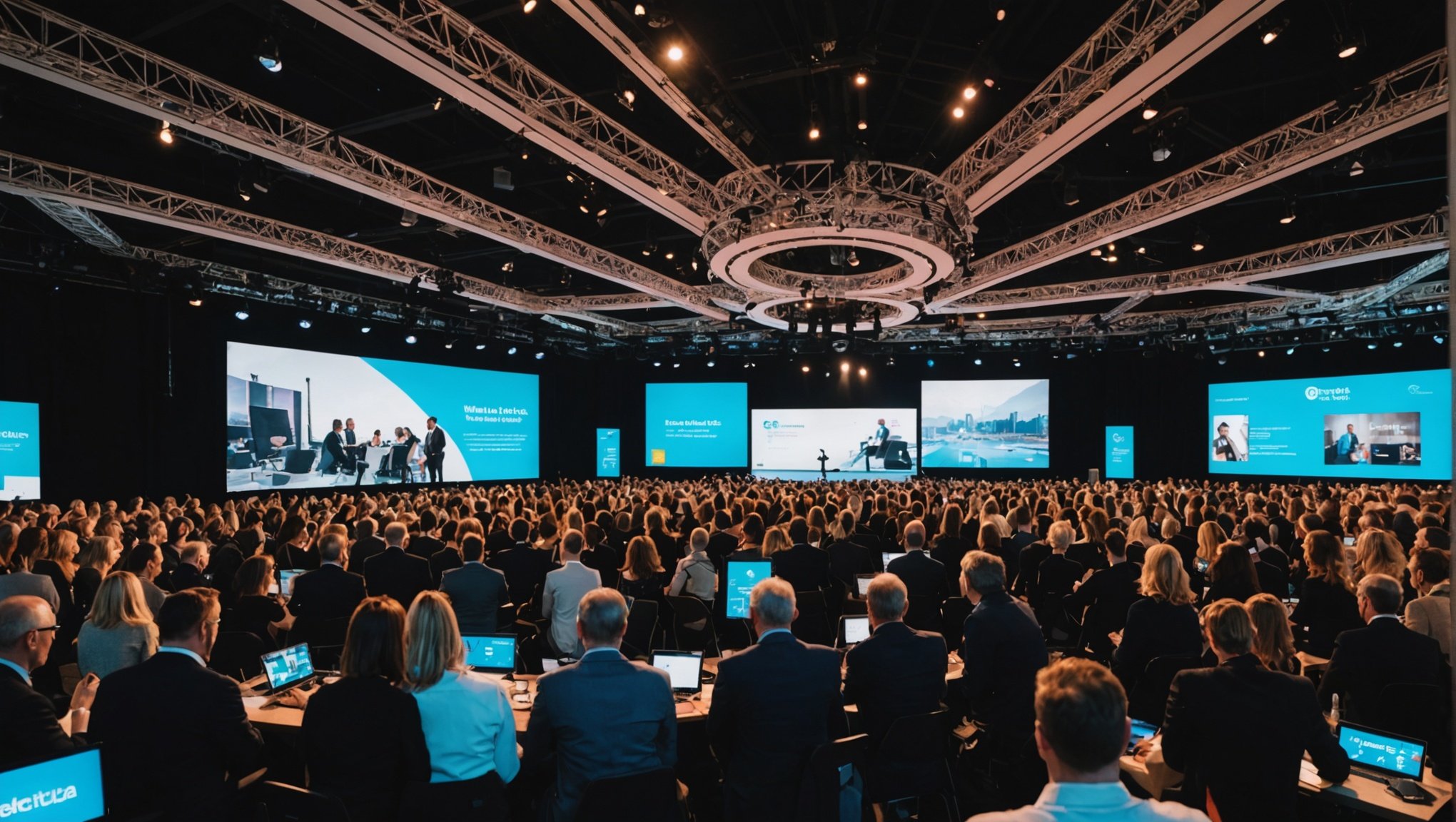Understanding Virtual and Hybrid Events
Navigating the world of event planning, particularly with the rise of digital platforms, is essential for modern-day organisers. At the core are two primary formats: virtual events and hybrid events.
Virtual events exist entirely online, eliminating the need for physical venues and allowing global participation through digital channels. In contrast, hybrid events combine elements of both the digital and physical worlds, providing opportunities for both in-person and online attendees. This dual approach supports diverse needs, making it a versatile choice.
Topic to read : Creative Tactics for UK Hotels to Boost Guest Loyalty: Unlocking Innovative Strategies
Understanding the differences and similarities between these formats can guide event planning strategies. Virtual events require robust technological infrastructure and creative engagement tactics to keep participants active and interested. Meanwhile, hybrid events demand coordination across both physical and digital spaces, offering a seamless experience for all attendees.
Importantly, gauging your audience’s preferences can determine the format’s success. Some may favour the convenience of attending online, while others seek the networking opportunities offered by in-person interactions. Knowing your audience allows you to tailor the experience accordingly, ensuring enhanced engagement and satisfaction, which are key to achieving event goals. Thus, recognising these audience dynamics is critical in the modern landscape of event planning.
Also read : Transforming Visitor Experiences: The Role of Augmented Reality in Elevating UK Tourist Attractions
Essential Technologies for Virtual and Hybrid Events
Virtual and hybrid events rely heavily on innovation and sophisticated event technology to be successful. The selection of a suitable virtual platform is paramount. These platforms serve multiple purposes including streaming, audience engagement, and data analytics. Choosing a platform with integrated tools can significantly enhance the experience for both organisers and attendees.
Top Platforms for Hosting
In the UK, several leading virtual platforms cater specifically to event planners. Notable options include Hopin, ZoomEvents, and ON24. These platforms offer robust features, such as customizable interfaces, integration with third-party applications, and ease of access, making them excellent hybrid solutions. Platforms like Hopin provide comprehensive capabilities for handling large virtual audiences in a seamless manner. Key features to look for in a platform include scalability, user-friendly navigation, and reliable customer support.
New advancements in event technology enable planners to customize their offerings based on their audience’s preferences and needs. By integrating sophisticated tools, planners can enhance audience experience through improved interaction and streamlined event management. As the demand for virtual and hybrid events increases, leveraging these advanced technologies becomes crucial for remaining competitive and ensuring successful event experiences.
Engagement Strategies for Attendees
Creating compelling audience engagement strategies is essential for the success of any event. To maintain interest during sessions, consider incorporating techniques like live polls, Q&A sessions, and interactive panels. These methods actively involve attendees, keeping them alert and invested in the content being presented.
The importance of virtual networking cannot be overstated, especially in an increasingly digital world. Facilitating networking opportunities through online platforms can significantly enhance the value of an event. Encourage participants to connect via social media groups or specialised networking apps that allow them to share ideas and foster professional relationships.
Interactive experiences are key to deepening participant involvement. Incorporate elements such as workshops, breakout rooms, or hands-on demonstrations that allow attendees to engage directly with the content and each other. These experiences not only make the event more memorable but also provide practical value that participants can apply in their respective fields.
In sum, combining these strategies effectively can transform your event into a dynamic and participatory experience, thus ensuring successful audience engagement and fulfilling networking objectives.
Budgeting and Cost Management
Careful budgeting and cost management are essential for successful events. Ensuring cost efficiency without undermining quality can be challenging, but feasible with proper planning.
Estimating Costs
To create an effective event budget, it’s crucial to accurately estimate costs. Consider all aspects, such as venue, logistics, and technology. For virtual and hybrid events, expenses may include platform subscriptions and tech support. It’s advantageous to anticipate potential fluctuations in costs and plan for contingencies.
Cost-Saving Tips
Maximizing budget efficiency can significantly aid in managing expenses. Negotiate with vendors to get the best deals. Opting for a hybrid format can also streamline costs by reducing physical venue expenses while still reaching a wide audience. Utilize open-source tools and platforms when possible to save on technology costs.
Evaluating Return on Investment
Assessing ROI involves tracking success metrics like attendee engagement and post-event surveys. Use data analytics to determine the financial impact and success of your event. By weighing the costs against the benefits, you can determine the overall return on investment and identify areas for improvement in future events. Proper evaluation ensures resources are wisely allocated, optimizing both current and future endeavors.
Case Studies of Successful Virtual and Hybrid Events
Examining success stories of hybrid events in the UK reveals valuable insights into effective strategies. One such event is the London Tech Week, which effectively blended live and virtual elements. By offering interactive online sessions alongside in-person networking opportunities, they increased participation and broadened their audience. This approach demonstrated how hybrid events could maximize both attendance and engagement.
Another noteworthy example is the Edinburgh Festival, which adopted an innovative broadcasting strategy. By leveraging livestreaming, they reached a global audience, greatly enhancing their visibility. This example showcases the importance of incorporating technological advances to expand audience reach and inclusivity in hybrid formats.
Key lessons learned from these events underline the significance of seamless integration between virtual and physical components. Organisers focused on ensuring that online participants received an equally enriching experience as their physical counterparts. This required meticulous planning of digital content and interactive elements. Best practices also emphasised the need for robust technical support to address any challenges during the event.
These case studies highlight the substantial impact of innovative strategies, not only in improving overall event success but also in setting a benchmark for future hybrid events.
Best Practices for Planning and Execution
Event planning is both an art and a science, where effective project management and strategic execution come together. Implementing event planning best practices is crucial to ensuring every aspect runs smoothly.
Pre-Event Preparation
Preparation is the backbone of successful events, particularly for virtual and hybrid formats. Begin by defining the objectives and ensuring that all logistical details align with them. Establish a comprehensive checklist to handle tasks such as securing speakers, planning technology needs, and organising marketing and registration. Choosing the right technology platform is key; it should support your goals, accommodate the audience size, and offer seamless interaction capabilities.
On-the-Day Management
Real-time monitoring and management are paramount on the event day. Assign clear roles to team members to cover tasks like technical support and audience engagement. Regularly check in with your team to address any arising issues swiftly and maintain communication with participants through chat or live polls.
Post-Event Follow-Up
Post-event, maintaining attendee interaction is essential for ongoing engagement. Send out thank-you emails, share event recordings, and offer surveys for feedback. Initiate future communication to build a community and transform your attendees into loyal event supporters.
Future Trends in Virtual and Hybrid Events
In the dynamic event industry, keeping pace with evolving technologies is crucial for future planning. As we look ahead, several emerging technologies are set to shape the future of virtual and hybrid events. Artificial Intelligence (AI) and augmented reality stand at the forefront, promising immersive experiences and enhanced attendee engagement. These technologies not only provide innovative ways to interact but also customise experiences based on individual preferences.
Post-pandemic preferences highlight a growing inclination towards convenience and flexibility. Attendees are increasingly favouring events that offer both in-person and virtual participation, allowing them to choose how they experience content based on their comfort and availability. This adaptability is becoming a key factor in future event planning success.
Innovation is paramount in this ever-changing landscape. Event planners must remain proactive, seeking out the latest tools that cater to these shifting preferences. This approach ensures events are not only relevant but also exceed attendee expectations. As technology advances, the ability to adapt swiftly will differentiate successful events from the rest. As the ecosystem evolves, those in the event industry who embrace these trends will likely lead the charge, setting new standards for engagement and interaction.











